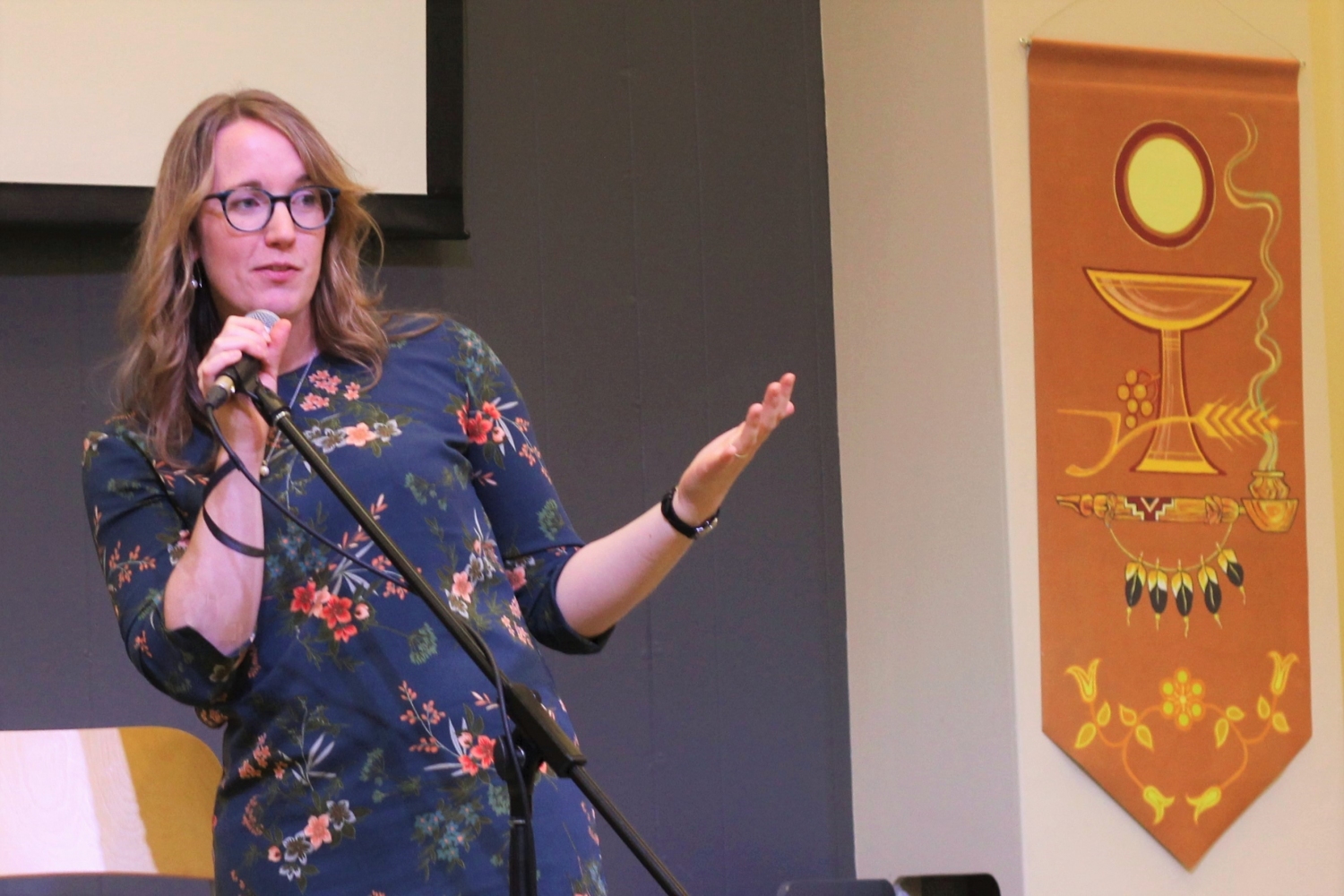News and Releases

Stories
Words that bear repeating: chapel attendance up as CMU embraces liturgy
Monday, February 10, 2020 @ 3:04 PM | Stories
 CMU's Spiritual Life Facilitator Danielle Morton speaks at one of the on-campus chapel gatherings
CMU's Spiritual Life Facilitator Danielle Morton speaks at one of the on-campus chapel gatherings
Thanks to a shift in approach, Tuesday all-campus worship gatherings at CMU are attracting a better, more consistent turnout from the student body. What's different? Spiritual Life Facilitator Danielle Morton says that incorporating liturgy has brought much-needed stillness, rest, and intimacy back to a campus worship routine that was not drawing attendance as it once had.
"CMU chapels happen twice a week for half an hour. That's not a lot of time. Even so, staff and faculty have been increasingly hesitant to lead chapel, feeling they lack the time and creativity required to plan a meaningful worship service from scratch, especially on regular rotation. When the Community Gatherings Committee considered the idea of having one weekly chapel structured by a set liturgy, a set form, laid out in advance but with moveable pieces that each week's leader could customize, the approval was just overwhelming. There was a sense of fresh opportunity."
"The only contingency was that we should still have what we've normally done on Fridays. A lot of students, and faculty too, really love those faith story chapels; they get to hear groups of their peers and even professors share in a way that just doesn't happen outside a worship context. As we moved in this direction, I started referring to Tuesdays as 'Prayer and Praise' chapels, and Fridays as our 'community' chapels."
These changes, Morton explains, were implemented in response to student, staff, and faculty feedback.
"The committee heard the community expressing a need for places of stillness, places where silence is appreciated and practised. This liturgical structure we're using would, previously, maybe come up only once or twice a semester. But each time it seemed to be getting good feedback and gaining traction; when people saw that it was coming up, they would make a point of attending chapel, even if they regularly might not."
Jamie Howison is priest and founder of saint benedict's table, an Anglican congregation in Winnipeg that has celebrated strong seasonal attendance from CMU students for 15 years, occasionally hosting practicum placements as well. Howison says this thirst for occasions to worship in stillness is an old one:

"Aware that a good number of students were joining our Sunday evening liturgy, I initially wondered why they rarely attended any of our other events. When I asked one of the students about this, she answered that the last thing any of them needed was yet another study group, lecture, or social function. Campus life already provides more than enough of these opportunities. 'What we don't have is Sunday worship,' she told me, adding that having a service in the evening was perfect for students who didn't want to get up early on a day off. Over the years students have also pointed to the contemplative tone of our liturgy, the importance of being welcomed openly to the communion table, the fact that we really value congregational singing, and—not least of all—the relative brevity of the sermons."
These core points—a reliable, contemplative structure for worship available at a convenient time, contained within a time frame that respects the limits of a student's best concentration—all inform the new approach Morton and her team are now taking to chapels at CMU:
"This liturgical move constitutes a fairly significant, though asked-for, change from the old way of doing things on campus, and a push toward styles less familiar in Mennonite circles. Amidst all this, we keep saying 'we don't want to throw the baby out with the bathwater, we just want to add a little bubble bath.' In the process, we are rediscovering that we can actually merge styles! We can use contemporary music within old forms or structures, ancient prayers in new settings. The only question for us is, how do we accomplish this elegantly?"
"Our current structure flows through six movements, taking the congregation through all the essential paces of connecting with God together, in half an hour: we prepare; we gather in worshipping God; we hear God's word; we confess our sins, fears, and failures, in prayer; we pray for ourselves and others; and we're dismissed to 'go in peace.' Our hope is that this liturgy will be simple enough to enter into regardless of students' background or experience."
While Sundays on campus remain unscheduled, leaving students free to worship as and where they choose, Morton says that creating a sense of spiritual home, keeping CMU students rooted throughout the week, is important to group health.
"For many students CMU is, functionally, their home congregation. Having songs and prayers they know by heart, that they can actually weave into their daily lives, is essential. With that in mind, we really have kept a very narrow repertoire this Fall, both of spoken and sung prayers, so that we can build up a repertoire, have a foundation. That way, when we eventually do add new material from time to time, people will have time to learn, and something familiar to fall back on each week. It's about building a sense of home."
CMU chapels run from 11:30 AM to noon at 600 Shaftesbury Blvd. Visitors are always welcome.
KEYWORDS: chapel, faith life, Danielle Morton, student life

 Print This Article
Print This Article